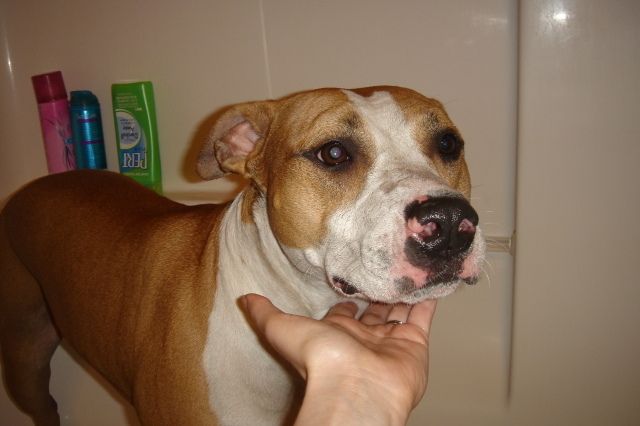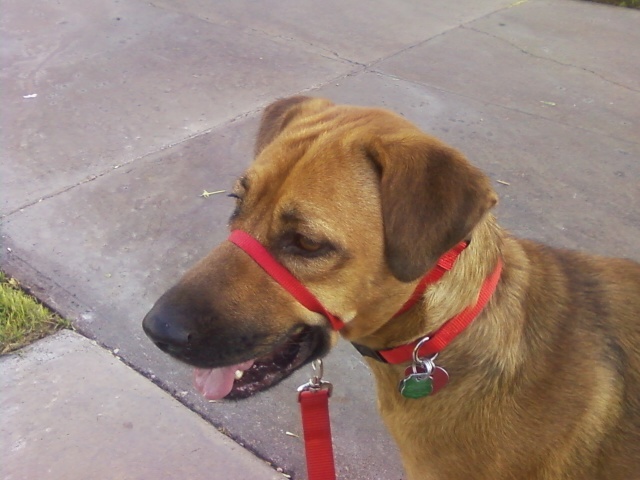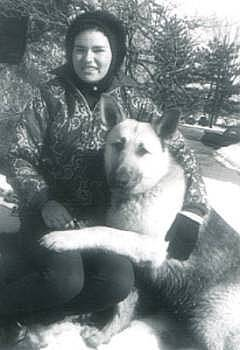Question-------------------------
Followup To
Question -
-------------------------
Followup To
Question -
-------------------------
Followup To
Question -
-------------------------
Followup To
Question -
-------------------------
Followup To
Question -
Date: 1/2/05 11:16 AM
Hello:
I'm doing research on dog breeds in other countries. What dog breeds are found in Jamaica, Haiti, the West Indies and the Caribbean? Please let me know. Thank you.
Sincerely,
Mr. Jason Goldman
JGoldman10@yahoo.com
Answer -
There are actually very few breed of dogs native to Jamaica, Hati, the West Indies and Caribbean. Being islands, it's easy to understand how dogs were not native to the island environments. Like many other animal species, dogs arrived through trade and colonization.
There are a couple of specific breeds of dogs which are associated with the region.
The Havanese ("Habaneros" in Spanish) is sometimes known as the Havana Silk Dog. The Havanese is the national dog of Cuba and its only native breed. These little dogs are a part of the Bichon Family and are descended from the same bloodlines that produced the Water Spaniel, Poodle, and Portuguese Water dog. It is believed that during the very early days of the Spanish Empire they were brought to Cuba by colonists and traders who sold them to wealthy Cuban families or gave them as gifts to win the favor of wealthy senoras.
Because of the later trade restrictions imposed by Spain, the breed developed without outside influence and evolved unique adaptations for the hot Cuban climate. It is a remarkably heat-tolerant dog, due to its unique coat. The coat is like raw silk floss, profuse, but extremely light and soft, and insulating against the tropical sun. In its native country, the coat was never clipped for this reason, and the hair never tied into a topknot, as the Cubans believe the hair protects the eyes from the harsh sun. The Havanese love the water and are accomplished swimmers when exposed to open water at an early age.
In spite of the trade restrictions, Havana became a popular vacation spot and by the mid-eighteenth century, the Havanese became very popular in Europe. Queen Victoria owned two and Charles Dickens had one called Tim, which was much beloved by his seven children. They were exhibited in the early European dog shows and type became well established. In Cuba meanwhile, times were changing. The aristocracy of the sugar barons was dying out and the bourgeoisie emerged. The little dog of Havana, adaptable as always, became an exceptional family dog, playmate of children, watchdog, and herder of the family poultry flock. It is a position he has held there for the past hundred and fifty years.
Another dog with a history in the West Indies/ Caribbean is the Chinese Crested dog. Although the origin of the Chinese Crested is thought to have been Africa, it is known that the ancient Mandarins of China liked their elegance, and kept them as pets, from where they gained their name. Chinese Crested dogs were often traded by the Chinese in the many eastern ports of Africa and Asia long ago. At sometime they made their way to Central and South America and to the West Indies where they have been known for centuries.
"El Gran Mastin de Borinquen", also known as the Puerto Rican Mastiff and the "El Gran Mastin" is the only breed native to the island of Puerto Rico.
The Puerto Rican Mastiff is a blend of Spanish War Mastiffs, traditional island dogs (Perros Jibaros) and Latin American Molossers, all brought to the island for protection from colonial times until the early 20th century.
Rarely available today, El Gran Mastin was established as an internationally recognized rare breed by la Sociedad Cynologica Caribena( S.C.C.) in 1979. A tremendous amount of interest has been generated by the work being done to carefully restore the dog to it's place among the Carribean dog fancy.
I hope that helps.
Regards,
Patti
Date: 1/2/05 10:10 PM
Thank you for your response-now I know who to contact here at AllExperts.com if I have any more dog breed questions. One of the other dog panelists responded to this question and told me from her experince that the only dogs she saw in Jamaica were mixed breeds. Most of the other dog panelists here that I posed these same questions to either said "This is outside of my expertise", or "Sorry, I don't answer homework questions." Thank you again.
Are you an expert on cat breeds? Please let me know. Thank you.
Sincerely,
Mr. Jason Goldman
JGoldman10@yahoo.com
Answer -
Hello Mr. Goldman,
I'm glad I could help you out.
Get back to me with your cat question, if I can I'll certainly answer your question, or I'll direct you to somebody that can.
-Patti
Date: 1/5/04 4:50 AM
Hello Patti:
I posed these questions with Norman Auspitz at the Cat forums here at AllExperts-he was trying to get answers for me, but I have yet to get a satisfactory answer from him. Here's my cat question:
I know that Birmans are found in Jamaica, and many cats are imported to Jamaica from Britan and southern UK. Are Abyssianians and Somalis found in Jamaica, Haiti, the West Indies and the Caribbean? What other cat breeds are found in the West Indies and the Caribbean? Are there any breeds indigenous to these areas? Please let me know.
Thank you.
Sincerely,
Mr. Jason Goldman
JGoldman10@yahoo.com
Answer -
Mr. Goldman,
I'm quite sure that Abyssinians and Somali cats can be found as pets in the West Indies and the Caribbean today. It's probably safe to say that the familar cat breeds can now be found as pets in the West Indies and the Caribbean.
If you're asking if the Abyssinians and Somalis breeds were developed in that region the answer is no. Abyssinian cats were developed in England, with the first "purebred" cat being registered in 1896. Somali is a more modern breed that is actually a long haired Abyssinian. The breed was developed in Canada, the oldest Somali line dates to 1963.
There is a breed of cat known as the Havana Brown, but their origins were probably from South East Asia. They first arrived in Britain in the 19th century. The breed got its name because it was the color of a fine Havana cigar, not because it's a native of the island of Cuba.
As far as I know, there aren't any breeds of cats developed in the Caribbean or West Indies. Like the dog, cats arrived through trade and colonization.
Feral cats are actually quite a problem on the islands of the Caribbean and West Indies. With no natural predators, cats seriously impact the native species (birds, amphibians, and reptiles) which they hunt as prey.
The feral cat problem continues to be a problem to this day. As recently as 1997, it was noted that fewer than 200 Anegada Iguanas were thought to exist in Jamaica, with none of the hatchlings reaching maturity due to the feral cats and other non-indigenous creatures in the area.
The problem is so bad, that throughout the Caribbean and West Indies, feral cats and dogs are euthanized in an attempt to control their population. Thankfully, there are also programs which deal with these unwanted population in more humane ways, but euthanization continues to be a sad fact in the fight to preserve native species.
I hope I've been a help.
Patti
Date: 1/16/05 1:16 AM
Hello Patti:
In response to your question, I was asking if Abyssianian and Somali cats are found in and imported to Jamaica, Haiti, and the West Indies and the Caribean-I kmow they didn't originate there? All the familiar breeds are imported to the West Indies and the Caribean? Does the US and Canada import cats to these areas also?
Do you know of any catteries in the Caribbean and the West Indies, and any that breed Aby's and Somalis? I was asking about Aby's and Somalis being in Jamaica, Haiti and the West Indies and the Caribbean, because I wasn't going to presume that they are.
What dog breeds are imported to the West Indies and the Caribbean? Please let me know. Thank you.
Sincerely,
Mr. Jason Goldman
JGoldman10@yahoo.com
Answer -
Hello,
I am unable to continue this discussion. I suggest you try a simple google search with West Indies or Caribbean catteries as your search query.
The Cat Fanciers' Association(http://www.cfainc.org/) or breed specific cat clubs may also be able to help you.
I'm sure you'll be able to find the answers you're looking for with a little persistence.
Best of luck,
Patti
Date: 1/6/05 1:04 Am
Hello Patti:
Thank you for responding. Did I do something wrong? Like I said, I know that Britain and the UK import cats the West Indies and the Caribbean. You don't know if the US and Canada import cats to these areas, or anywhere? Are the dog breeds you listed the only ones found in the Wset Indies and the Caribbean? Are other breeds imported there? Where did the feral cats and dogs come from? Please let me know. Thank you.
Sincerely,
Mr. Jason Goldman
JGoldman10@yahoo.com
Answer -
Hello,
You didn't do anything wrong. It's just that I can't help you with this.
I simply do not know if the US and Canada import cats to the West Indies and the Caribbean. I am sure they do, and the The Cat Fanciers' Association (which I gave you the web address for) can provide the information you are requesting, not just for Abyssianian and Somali cats, but for any other breed.
Regards,
Patti
Date: 1/7/05 11:51 AM
Hello Patti:
Thank you again. Getting back to my dog questions-are the Chinese Crested, the Havansese, and the Puerto Rican Mastiff the only dog breeds found in the West Indies and the Caribeean? Are other breeds found there also, or imported there? Please let me know. Thank you.
Sincerely,
Jason Goldman
JGoldman10@yahoo.com
AnswerHello,
If I knew of any dog breeds other than the Chinese Crested, Havansese, and Puerto Rican Mastiff which were developed in the West Indies/Caribbean region, I would have included them in my first response to your message.
I can not provide you with more info than that. The American Kennel Club (http://www.akc.org/), the The Caribbean Kennel Club or the Barbados Kennel Club can offer more help than I can at this point. They are the best bet for getting the amswers you are looking for.
The Caribbean Kennel Club does not have a web address, instead you may write to them at:
PO Box 737
Port of Spain
Trinidad
The Barbados Kennel Club doesn't have a web site either, but you may write to them at: bkc@caribsurf.com
Best of luck,
Patti

 Dog breed?
QuestionQUESTION: Hi Nancy,
I am attaching an image of
Dog breed?
QuestionQUESTION: Hi Nancy,
I am attaching an image of
 My dog Kiya
Question
Kiya
My new dog Kiya is a 2 yr old German Shep
My dog Kiya
Question
Kiya
My new dog Kiya is a 2 yr old German Shep
 Engorged Breasts
Question
mamma
My Friends Dog Had A Litter About
Engorged Breasts
Question
mamma
My Friends Dog Had A Litter About
 8wk old pup biting
Question
pebbles
hi i wonder if u can help me my
8wk old pup biting
Question
pebbles
hi i wonder if u can help me my
 What dog is right for me?
QuestionHi,
my name is Miriam and I am 12 years old.
What dog is right for me?
QuestionHi,
my name is Miriam and I am 12 years old.